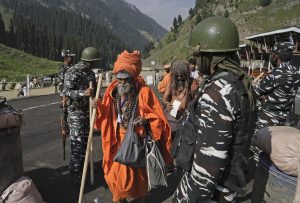Thousands of Hindu devotees began an annual pilgrimage Thursday through mountain passes and meadows to an icy Himalayan cave in Indian-controlled Kashmir amid heavy security in the Muslim-majority region.
Officials say pilgrims face heightened threat of attacks from rebels fighting against Indian rule and have for the first time tagged devotees with a wireless tracking system. They also have deployed drones for surveillance.
The religious activity has been the target of past attacks by suspected Muslim rebels who accuse India of using it to reinforce its grip over the disputed region. This year’s pilgrimage comes after two years of suspension because of the coronavirus pandemic.
The worshippers began their arduous trek early Thursday through forested mountain passes with a view of snowy peaks. Some rode ponies or wooden litters carried by porters. Some chanted religious hymns on their way to pray at the hallowed mountain cave’s Amarnath shrine, where Hindus worship Lingam, a naturally formed ice stalagmite inside the cave, as an incarnation of Shiva, the Hindu god of destruction and regeneration.
In massive security arrangements, tens of thousands of police and soldiers carrying automatic rifles and wearing flak jackets have been deployed to guard the pilgrimage. They have set up checkpoints, barricades, and temporary camps along the routes leading to the cave.
At a mountain base camp, a group of devotees said they were ecstatic to see elaborate arrangements and praised Indian soldiers for the security measures.
“It feels like I’m walking in my village,” said Pravin Kumawat, a pilgrim from northern Rajasthan state.
Rajinder Sharma, a Hindu ascetic from central Indian state of Madhya Pradesh, said he has been undertaking the pilgrimage for the last two decades.
“I prayed (the last time) that Article 370 must go, and it happened,” Sharma said, referring to India’s constitutional provision that gave Kashmir semiautonomy, which was revoked by Prime Minister Narendra Modi’s Hindu nationalist government in 2019 amid total lockdown and communication blackout. “Now I will also pray that our country becomes a Hindu nation.”
Muslim rebels fighting for decades against Indian rule in Kashmir accuse Hindu-majority India of using the pilgrimage as a political statement to bolster its claim on the disputed Himalayan region.
In the past, the pilgrimage has been targeted by the rebels who have been fighting for Kashmir’s independence from India or its merger with neighboring Pakistan since 1989.
In 2017, gunmen sprayed bullets at a bus carrying Hindu pilgrims in the region, killing at least seven people and wounding 19 others while they were returning from the cave shrine.
The Indian government blamed Muslim rebels for the attack. However, separatist leaders accused Indian intelligence agencies of carrying out such attacks to sabotage Muslims’ struggle for self-determination.
Many Kashmiri Muslims have long complained that the government curbs their religious freedom on the pretext of law and order while promoting and patronizing the Hindu pilgrimage.
At least 50 pilgrims have been killed in three dozen attacks blamed on militants in past three decades. However, hundreds have died due to exhaustion and exposure in harsh weather during journeys in the icy mountains.
Hundreds of thousands of Hindus from across India typically take part in the pilgrimage, which lasts up to 45 days. This year, officials expect nearly a million visitors after the two-year gap in the annual endeavor.
Worshippers approach the Amarnath cave through two routes: a traditional one via southern hill resort of Pahalgam that takes three days, or a one-day-long travel through northeastern Baltal. Some also use helicopter services to pay quick obeisance.
The cave, at 13,500 feet (4,115 meters) above sea level, is covered with snow most of the year except for a short period in summer when it is open for the pilgrims.
The pilgrimage concludes on August 11, a full-moon night that Hindus say commemorates Shiva revealing the secret of the creation of the universe.
































